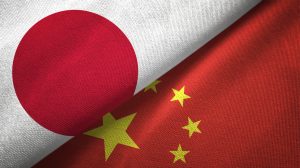At the very end of 2021, Japan’s Defense Minister Kishi Nobuo spoke with Wei Fenghe, State Councilor and Defense Minister of China by video conference. The two ministers exchanged views on the bilateral relationship and the regional situation.
The conference touched on several areas of particular interest to Japan.
First, the ministers confirmed the importance of the timely establishment of a China-Japan defense hotline between to improve the effectiveness of the Maritime and Aerial Communication Mechanism, with Kishi and Wei agreeing that they would aim to begin operation of the hotline by the end of 2022
The hotline will need to function as a crisis management mechanism. As such, to attenuate the risk of conflict, it is essential that Tokyo and Beijing agree on what exactly will prompt use of the hotline system. In other words, what kind of crisis, and where.
Given that Japan and China have competing territorial claims, however, it will not be easy to nominate the Senkaku Islands (known in China as the Diaoyu Islands) as a potential site for a crisis. That could mean that the hotline is not available as a crisis management tool precisely where it is most needed. What is a crisis for one party may not be seen as such by the other, with the latter thus not using the hotline.
Ultimately, the significance of the agreement to set up a hotline is not that its operation will reduce risk. Rather, it lies in the fact that the most senior defense representatives of Japan and China were able to engage in direct dialogue and agree on at least one point.
Kishi and Wei also discussed the situation in the East China Sea, including the waters around the Senkaku Islands. Kishi stated that Japan opposes attempts to unilaterally change the status quo through coercive means. He expressed Japan’s grave concerns at the actions of People’s Liberation Army (PLA) and China Coast Guard (CCG) vessels, urging China to exercise self-restraint.
Ultimately, the two ministers only went so far as to restate their respective claims to the disputed islands. Japan’s call for “self-restraint” from China is unlikely to result in any significant change in the CCG’s activities in the waters around the Senkaku Islands. In fact, by the time the conference took place, on December 27 the CCG had already exited the contiguous zone around the Senkaku Islands, having left the zone on December 24. The very next day, however, on December 28, CCG vessels reentered the zone. This hints at the importance China attached to the conference. It also suggests that the order to engage in CCG activities in the waters around the Senkaku Islands came not from the CCG itself, but from a more senior level.
In recent years, it has become the norm for China to enter the territorial sea around the Senkaku Islands, navigate through the contiguous zone, and have CCG vessels pursue Japanese fishing boats. In 2021, CCG vessels navigated through Japan’s contiguous zone on 332 days. This was second only to the 333 days in 2020. Also in 2021, 18 incidents involving CCG vessels approaching and pursuing Japanese fishing boats in the territorial sea around the Senkaku Islands occurred, double the number of such incidents in 2020.
Japan will continue to respond to the CCG’s activities in these waters as it has been doing. Namely, it monitors intrusions by CCG vessels and assesses any CCG vessels claiming to be patrolling according to Chinese national law as “non-innocent” activities based on the United Nations Convention on the Law of the Sea (UNCLOS), demanding that the CCG vessels withdraw from its territorial sea in exercise of the “right of protection” granted by UNCLOS.
With a growing incidence of Japanese fishing boats being approached and pursued by CCG vessels, Japan needs to be prepared for a situation in which CCG apply and enforce Chinese national fishing laws and regulations to Japanese fishing boats – for instance, by boarding and inspecting fishing vessels.
In the meantime, Kishi also referred to Taiwan, stating that peace and stability in the Taiwan Strait is vital for Japan’s security and that Japan will continue to closely monitor developments. For the Japanese government to make a clear association between the Taiwan Strait issue and Japan’s security issues in an official forum is a significant development.
It is important that Japan and China continue to engage in communications of this kind. Japan needs to convey to China in a number of different formats that it is neither in China’s domestic nor international interest to bring about a crisis in the Taiwan Strait. However, communication alone is unlikely to mitigate or prevent what China’s leadership seems determined to do. Japan needs to take other measures to deter China in cooperation with its international partners, based on an assessment of the PLA’s capabilities.

































